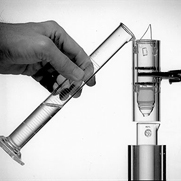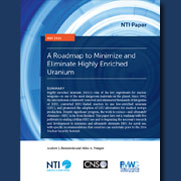
Anya Loukianova
Research Associate, The James Martin Center for Nonproliferation Studies
About the image
Every year, medical professionals worldwide carry out more than 30 million procedures using the medical isotope technetium-99m (Tc-99m), which is derived from its parent, molybdenum-99 (Mo-99).
Mo-99 is often produced using weapons-useable highly enriched uranium (HEU), a major target for terrorist groups seeking to build a nuclear device. To address this risk, the U.S. government has been working with international partners to minimize the use of HEU in civilian applications, with a recent push to convert aging reactors that use HEU for Mo-99 production to processes using LEU or alternative methods.
The challenge? Countries must accomplish such conversion without interrupting the supply of medical isotopes vital to medical procedures. Growing demand for Mo-99 in the medical field, a history of shortages and a planned shut-down of one of the radioisotopes' major producers raises uncertainties, which Anya Loukianova explores in a new Center for Nonproliferation Studies issue brief.
"The leadership of key countries, and especially those involved in conversion or new HEU-free production, has been essential in building the emerging HEU-free Mo-99 production consensus," writes Loukianova. "This international commitment could be further strengthened through continued rigorous technical cooperation and high-level dialogues in fora such as the Nuclear Security Summit."
The onus for change must be on consumer countries of Mo-99 and health regulators to help shape demand for Mo-99 produced without weaponse-useable HEU. "Finding a timely solution to the dual challenge of making the Mo-99 supply chain reliable and HEU-free is critical," writes Loukianova.
Read the issue brief.
Sign up for our newsletter to get the latest on nuclear and biological threats.
The Civilian HEU Reduction and Elimination Resource Collection has been updated by CNS in the wake of the April 2016 Nuclear Security Summit (NSS).
A new paper published by NTI, the Center for Nonproliferation Studies and the Fissile Materials Working Group offers timely recommendations for action that countries can pursue ahead of the 2016 Nuclear Security Summit.
NTI Co-Chairman Sam Nunn welcomes the news that Ukraine will eliminate its highly enriched uranium.


